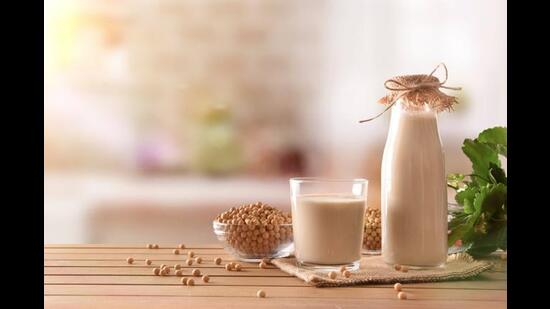From hindustantimes.com
Of late, many people have started opting for non-dairy, plant-based milks for reasons including health, lactose intolerance or veganism
Of late, many people have started opting for non-dairy, plant-based milks for reasons including health, lactose intolerance or veganism. Shweta Shah, nutritionist, says, “The biggest myth is that protein is only found in dairy milk. Many people around the world consume non-dairy milk out of respect for animals. They are better for the environment as well.”
Shah adds, “Non-dairy milk takes care of almost all elements of your nutrition. A vegan diet, which contains milk from plant sources, can improve heart health, aid in weight loss and lower the risk of chronic diseases.”
We explore the health benefits for the most popular plant-based milks on World Milk Day:
Soy Milk
Soy milk is the most nutritionally-balanced of the plant-based milk alternatives. It is beneficial only when it is made from Non-GMO whole soybean. The protein in soy milk is healthy, plant-based, and can help support healthy muscles and organs. Soy milk is rich in omega-3 fatty acids, which are “healthy” fats that your body cannot form on its own. Soy protein can help lower levels of LDL, or bad cholesterol. Each cup of unsweetened, plain soy milk provides 7 grams of protein. Soy milk contain isoflavones that perform functions in the human body similar to the hormone oestrogen.

Oat Milk
Oat milk is a dairy-free alternative grain milk. It is suitable for people with allergies, dairy intolerances, or those who follow a plant-based or vegan diet. Oat milk has twice the dietary fibre than cow’s milk making it an excellent choice for adding fibre to your diet for healthy gut and digestive functions. Specifically, beta glucan, a soluble fibre strengthens the immune system, regular consumption can prevent infection and improves the body’s ability to naturally heal itself.
Almond milk
Almond milk is a healthy and nutritious alternative to dairy milk. It is one of the most popular products derived from almonds. It is lactose-free and can be a healthy alternative for lactose intolerance. It contains rich and multiple nutrients. Almond milk is a low carb beverage, making it a perfect choice for people on a low carb diet and those who need to keep a check on their blood sugar levels. Almond milk is rich in vitamin E, which is an important antioxidant. Vitamin E can help lower your risk of serious health conditions like stroke, heart disease, and even cancer. Its bioactive plant compounds including polyphenols, are responsible for many of the health benefits of almonds. These compounds have anti-inflammatory and antioxidant properties that are good for heart health.
Rice milk
Rice milk is a dairy-free type of milk that is prepared with boiled rice, and brown rice starch and syrup. There are no animal by-products in this milk, making it a very popular option for vegetarians and vegans
This popular milk alternative has a wide range of impressive nutrients, including roughly 140 calories per cup, and only about 3 grams of fat
the top health benefits of rice milk include aiding skin health, strengthening the bones, increasing energy metabolism and optimizing digestion, among others.
It is a good choice for people with lactose intolerance or allergies to milk, soy, or nuts.
Coconut milk
1.Coconut milk is one of the many varieties of plant-based alternatives to cow’s milk.Coconuts contain significant amounts of fat, but unlike other nuts, they provide fat that is mostly in the form of medium-chain saturated fatty acids (MCFAs) – in particular, one called lauric acid. 50% of the MCFAs in coconut oil are a type called lauric acid, which is converted in the body into a highly beneficial compound called monolaurin, an antimicrobial, anti-fungal and anti-inflammatory that destroys a wide variety of disease-causing organisms.
2.Coconut milk is rich in electrolytes such as potassium, magnesium and phosphorous
3.Coconut milk is rich in short and medium chain triglycerides that are considered to be healthy fats. They prolong the feeling of satiety causing you to eat less and avoid giving in to cravings
4.Coconut milk is a healthy substitute for individuals that are lactose intolerant. In addition, it contains Zinc, a mineral that aids in the renewal of the cells that line the intestinal wall. This prevents the translocation of harmful bacteria from the intestinal lumen into the blood stream and reduces the incidence of diarrhoea.
Hemp milk
A popular plant-based alternative to cow’s milk, it has an earthy, nutty flavour and a creamy consistency. It’s one of few plant-based complete proteins, as it contains all of the essential amino acids that humans need from food. It is also naturally free of soy, lactose and gluten, making it a good option for people who need or want to avoid these components. It is beneficial to the brain because it contains a high concentration of Omega 3 and Omega 6 fatty acids in an ideal ratio, which is between 2:1 and 3:1 Getting balanced amounts of omega-6 and omega-3 from foods can support your skin’s immune response to inflammation and aging.
Hemp is rich in the amino acid arginine, which your body needs to create nitric oxide. Nitric oxide helps relax blood vessels and maintain a healthy blood pressure Getting adequate arginine may also lower your blood levels of the inflammatory C-reactive protein (CRP). High levels of CRP are associated with higher risks of heart disease
Hemp contains essential fatty acids that may improve inflammatory skin conditions and promote skin health. It’s also rich in arginine, a nutrient that may protect against heart disease.
Inputs by Nishtha Gokhru, Nutrition Expert
No comments:
Post a Comment